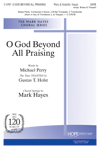- |
User Links
O God Beyond All Praising
Hymn Information
- First Line
- O God beyond all praising
- Author
- Michaal Perry, 1942-1996
- Tune Name
- THAXTED
- Composer
- Gustav Holst, 1874-1934 (1921)
- Topic
- Praise of Christ · Praise of God · Elements of Worship: Praise and Adoration
Copyright Information
- Text Copyright
- © 1982, 1987 The Jubilate Group, admin. Hope Publishing Company
- Tune Copyright
- Public Domain
- Reprint/Projection Information
- Words: Permitted with a license from CCLI.com or from OneLicense.net. If you do not own one of these licenses, please contact the copyright holder for permission.
- Music: The Music is in the Public Domain; you do not need permission to project or reprint the Music.
Full Text
Scripture References
- · · · · · · · · ·
Further Reflections on Scripture References
See how Psalm 148 is the primary reference, but a similar thought is found in Psalms 8, 33, 104, and 135. In addition, God’s provocative questions to Job in Job 38-41 aim to stir similar praise, awe and humility. However, back in Genesis 1 and 2 we are motivated to do the same.
Confessions and Statements of Faith References
Further Reflections on Confessions and Statements of Faith References
The best-loved expressions of praise for God’s care-taking work of his children comes from the familiar words of Heidelberg Catechism, Lord’s Day 1, Question and Answer 1: “My only comfort in life and death [is] that I am not my own, but belong—body and soul, in life and in death—to my faithful Savior, Jesus Christ. He has fully paid for all my sins with his precious blood, and has set me free from the tyranny of the devil...Because I belong to him, Christ by his Holy Spirit, assures me of eternal life and makes we wholeheartedly willing and ready from now on to live for him.”
This great truth is explained more completely by Belgic Confession, Article 20. God has given his Son to die for us “…by a most perfect love, and raising him to life for our justification, in order that by him, we might have immortality and eternal life.” And in Article 21, “…He endured all this for the forgiveness of our sins.” For this redemptive work we give praise and adoration.
O God Beyond All Praising
Additional Prayers
Generous God, overflowing fountain of gifts, we praise and thank you for blessings without number and mercies without end. To you we lift our hearts at the opening of worship, knowing that we are safe in your presence and secure in your love, through Jesus Christ our Lord. Amen.
O God, beyond all praising, still we praise you because it is right and proper and fitting at all times and in all places. It is healthy for us to acknowledge your greatness and call attention to your goodness, which we do now and throughout our time of worship, through Jesus Christ our Lord. Amen.
O God Beyond All Praising
Tune Information
- Name
- THAXTED
- Key
- B♭ Major
- Meter
- 7.6.7.6 triple


 My Starred Hymns
My Starred Hymns






